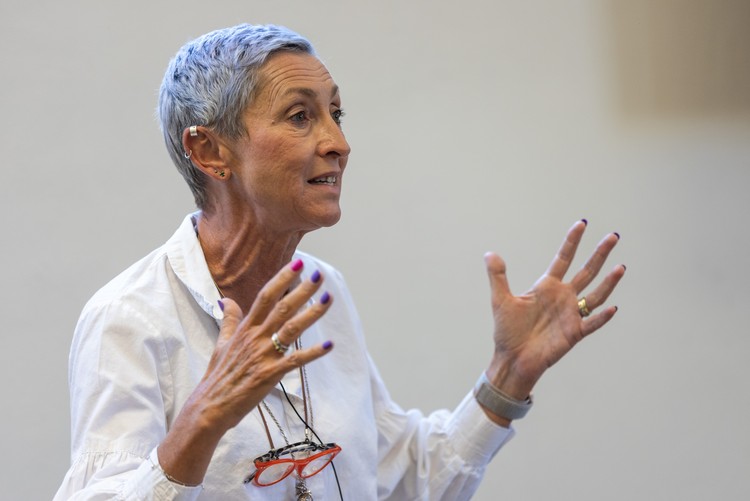“Rebuild Pollsmoor prison” says TB expert
Prof Linda-Gail Bekker spoke at the first GroundUp/Bertha House Science for the People seminar
Professor Linda-Gail Bekker gave the inaugural Science for the People seminar. Photo: Ashraf Hendricks
“If you go to prison today, you will get TB,” said Professor Linda-Gail Bekker, director of the Desmond Tutu HIV Centre. One of the reasons for this is overcrowding in Pollsmoor’s remand area, where inmates awaiting trial have to sleep in shifts due to a lack of beds.
Bekker was speaking on Friday at the first in a series of Science for the People seminars hosted by GroundUp and Bertha House in Cape Town. Her talk was titled The science of TB prevention and treatment.
She said that Pollsmoor needs to be rebuilt if TB is to be brought under control at the prison.
“Every day about 4,000 people around the world die from tuberculosis,” Bekker said. Sub-Saharan Africa and Southern Africa in particular is the epicentre. “In Cape Town, we live in a sea of TB, I’m sorry to say, yet most of us go about our lives without being aware of it.”
The bacteria that causes TB is latent in most people, but in cases where it causes disease, it is deadly. People with HIV and Diabetes are particularly at risk of severe illness. Treatment for TB involves taking antibiotics for six months. “If you don’t treat it, it’s going to kill you eventually,” Bekker said.
TB is a notifiable disease, which means every detected case must be reported to the National Institute of Communicable Disease. Bekker said that Cape Town alone notifies more TB cases than the whole of the USA, UK and Switzerland do every year. As the HIV epidemic hit South Africa, the country experienced a spike in TB infections and deaths. Efforts to get TB under control have not been sufficient and have been hampered by the Covid pandemic as resources were seconded to fight the new virus.
While Bekker stressed the importance of increased screening, testing, and treatment, she also emphasised the hurdle caused by structural issues such as inadequate housing. Overcrowding in homes and lack of ventilation increase the transmission of TB. “Unless we deal with structural issues, we’re not going to get TB under control,” Bekker said.
Ventilation, distancing, and mask-wearing are crucial to prevent transmission. Prevention therapy, earlier diagnosis and sterilisation, and sustained care need to be improved to better treat people who have TB, Bekker said.
But we also need an effective vaccine. Because TB is most prevalent in lower-income countries, Bekker said, there has not been enough pharmaceutical innovation. Most of the antibiotics used to treat TB today have been used since the 1960s. In recent years there has been some innovation taking place, Bekker said, but not enough.
Next: “Poo protests” turn violent in Gqeberha
Previous: Give us electricity or move us, says Mamelodi community
© 2023 GroundUp. This article is licensed under a Creative Commons Attribution-NoDerivatives 4.0 International License.
You may republish this article, so long as you credit the authors and GroundUp, and do not change the text. Please include a link back to the original article.
We put an invisible pixel in the article so that we can count traffic to republishers. All analytics tools are solely on our servers. We do not give our logs to any third party. Logs are deleted after two weeks. We do not use any IP address identifying information except to count regional traffic. We are solely interested in counting hits, not tracking users. If you republish, please do not delete the invisible pixel.



